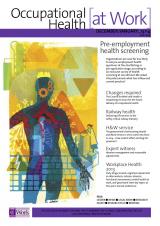December/January 2013/2014 (vol. 10/4)
ContentsFeaturesNewsLegal
NewsResearch DigestResearch PlusCPD
Research Plus
Sleep quality
High job demands and low job control are significant predictors of poor sleep quality, according to this systematic review (20 included papers). Poor sleep quality is defined as having at least one of the following symptoms at least three times a week: difficulty initiating sleep; problem maintaining sleep; waking up too early; or non-restorative sleep. Analysis of 16 longitudinal studies – three of high quality – found sleep quality to be negatively associated with job demands and positively associated with job control, with small to moderate effect sizes (significant ORs ranged from 1.24 to 2.05). There was just one high-quality intervention study, where hospital employees implemented solutions to various problems with job demand, job control, social support and effort–reward imbalance. Work characteristics improved, but there was no change in sleep quality.
Psychosocial work characteristics and sleep quality: a systematic review of longitudinal and intervention research. Scandinavian Journal of Work, Environment and Health 2013; online first: doi: 10.5271/sjweh.3376.
Occupational Health at Work December/January 2013/2014 (vol. 10/4) pp45



